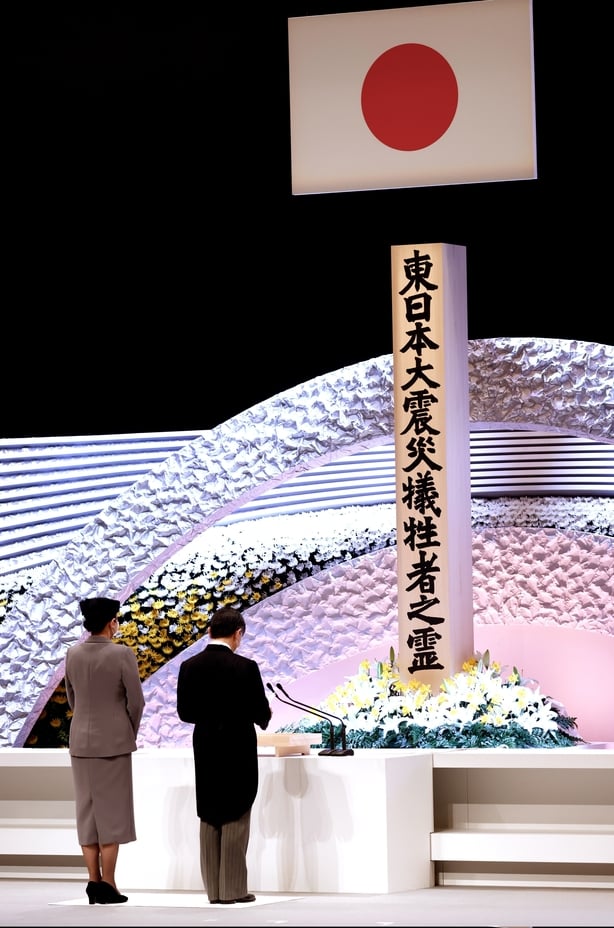Japan fell silent today to mark ten years since the worst natural disaster in the country's living memory: a powerful earthquake, deadly tsunami and nuclear meltdown that traumatised a nation.
A minute of silence was observed across the country at 2.46pm local time (5.46am Irish time), the precise moment a 9.0 magnitude quake hit off the northeast coast on 11 March, 2011.
Around 18,500 people were killed or left missing in the disaster, most of them claimed by the towering waves triggered by one of the strongest quakes ever recorded.
The ensuing nuclear meltdown at the Fukushima Daiichi nuclear plant blanketed nearby areas with radiation, rendering some towns uninhabitable for years and displacing tens of thousands of residents.
Speaking at a ceremony in Tokyo's national theatre, Emperor Naruhito said the "unforgettable memory of the tragedy" persisted a decade on.

"Many of those afflicted, in spite of their having suffered from unimaginably enormous damage, have overcome numerous hardships by helping one another," he added.
The annual memorial event was held before a smaller audience than usual, with the capital and nearby areas currently under a virus state of emergency.
Prime Minister Yoshihide Suga said the challenges faced by survivors had been compounded by the pandemic and natural disasters, including a recent strong quake in the region, classified as an aftershock of the 2011 tremor.
But he said Japan had always "overcome every crisis with courage and hope".
Private and public commemorations were seen across Japan as bereaved local residents laid flowers at graves and placed letters to missing family members into the sea.
We need your consent to load this rte-player contentWe use rte-player to manage extra content that can set cookies on your device and collect data about your activity. Please review their details and accept them to load the content.Manage Preferences
'People died before my eyes'
Searches for those still missing are taking place this week, as loved ones refuse to relinquish hope of finding them even a decade on.
The chances of success may appear slim, but just last week the remains of a woman missing since the tsunami were identified, in what her surviving son described as a chance to process his emotions and move forward.
The disaster is being marked just two weeks before the Olympic torch relay kicks off in Fukushima prefecture, nodding to efforts to cast the event as the 'Reconstruction Games'.
The pandemic has cast a long shadow over the Olympics, forcing their unprecedented year-long postponement, but the government and organisers are hoping the relay will bring the spotlight back to the region.
A decade on, the disaster has shaped Japan's preparations for natural disasters, with many towns along the coast building new or higher sea walls.
Evacuation routes and plans have been refined and improved in a country that regularly deals with disasters ranging from typhoons to earthquakes.
Nayuta Ganbe in Miyagi's Sendai city speaks often at events about disaster prevention, sharing his experience of the tsunami, but he usually marks the anniversary privately.
"It's the day when I lost my classmates. People died before my eyes. March 11 is a day that I hoped would never come again," the 21-year-old told AFP recently.
But this year he has decided to participate in an event on the anniversary, hoping it will help him with the ongoing work of processing the trauma he experienced.
For others, the anniversary will be a moment for private reflection on a tragedy that continues to reverberate.
Tens of thousands of people who evacuated fearing radiation are still displaced, and around 2% of Fukushima remains off-limits.
Most of Japan's nuclear reactors are still offline, and government plans to revitalise the sector are controversial.
10 years on from Japan's 'wave from hell'

